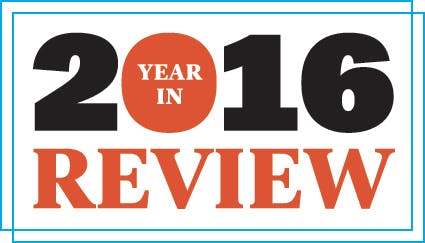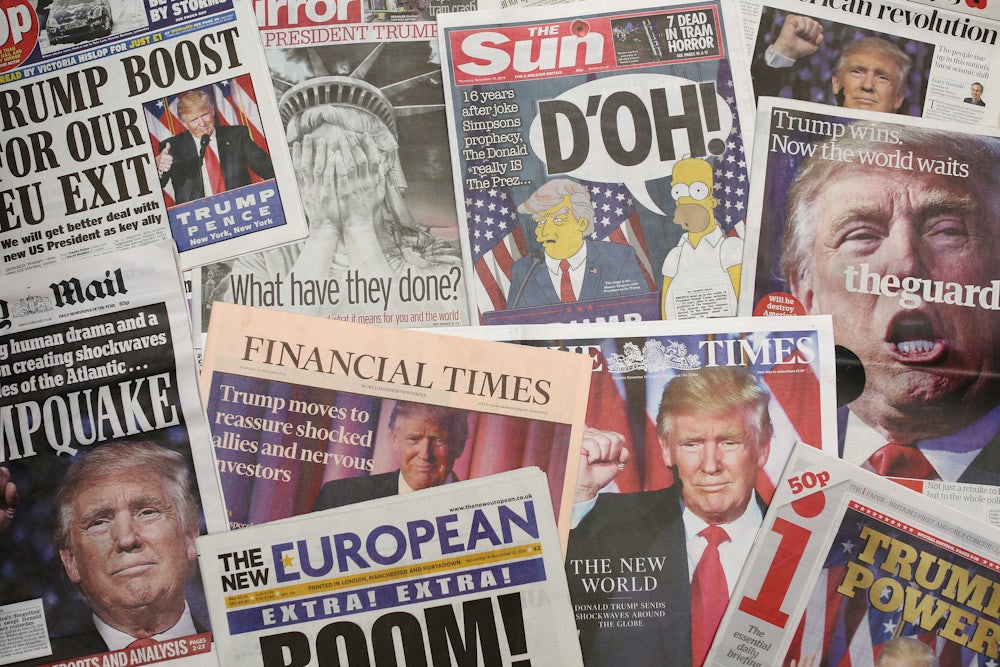
A lot happened this year. We are both cursed and blessed to live in interesting times, and the past twelve months have been packed with world-historical events. But you may not have known it by the way one story—the election of Donald Trump—dominated the headlines and cable news roundtables. In retrospect, we can see a familiar pattern: A huge story comes to the fore, only to quickly be supplanted by Trump’s latest antics on the campaign trail. In much the same way he captured the culture, Trump simply overshadowed almost everything else that happened in America and around the world.
And while the election of the president of the United States is indeed an event of the highest importance—particularly when the president in question is as controversial as Trump—there were other milestones and revelations that would have received more attention if he had been absent from the race. Here’s a look back at some of the biggest stories of the year—and how quickly they faded from view.
January
President Obama declared a state of emergency in Flint, Michigan, one of the poorest cities in the country, where thousands of its overwhelmingly black residents were exposed to toxic levels of lead in their tap water. Republican Governor Rick Snyder caused this crisis by appointing an emergency financial manager for the city, who switched its water source from the pristine Lake Huron to the contaminated Flint River as a cost-cutting measure. Despite the federal, state and local response to this disaster—and more money hopefully, finally, on the way from Congress—the water is still not safe. The delayed response, including by government agencies like the Environmental Protection Agency, was a damning indictment of how the neediest communities are often the last to get what they need.
Yet the first month of 2016 was dominated by Trump’s raucous rallies leading up to the Iowa Caucuses, made-for-TV spectacles that often ran in their entirety on cable news and were marked by confrontations with protesters.
February
Supreme Court Justice Antonin Scalia, a giant of the American right, passed away, leaving a rare vacancy on the Supreme Court with the potential to swing the Court’s ideological balance to the left for the first time in decades. It launched one of the most under-appreciated political storylines of the year: the unprecedented refusal of Senate Republicans to even hold hearings for Obama’s nominee, Merrick Garland. This was a huge violation of governing norms, the most glaring evidence yet of total gridlock in Washington, but the GOP’s bet paid off in spades: Garland was all but forgotten in the election, and voters declined to punish Republicans for their obstructionism.
Republicans were helped by Trump’s ability to dominate the spotlight. This was the month he infamously said of one protester, “I’d like to punch him in the face.” It was also the month Trump escalated his attacks on “Lyin’ Ted” Cruz and “Liddle Marco” Rubio. He fought with Pope Francis over his proposed border wall with Mexico, refused in a CNN interview to disavow the support of former Ku Klux Klan leader David Duke, and re-tweeted a Nazi-supporting account with the handle @WhiteGenocideTM.
March
ISIS took credit for bombings in Brussels, Belgium, that left 32 dead and hundreds more injured. Striking at the bureaucratic capital of Europe, where NATO and the European Union are headquartered, the bombings were part of a wave of terrorist attacks across Europe that stoked fears about an influx of refugees from Syria and other destabilized areas and laid bare the poisonous disillusionment of a fringe of Europe’s minority Muslim populations. The Brussels attack came just four months after the Islamic State took credit for killing 130 people in Paris.
Trump used the attack for his own fear-mongering purposes—“This is going to happen in the United States”—and reiterated his call for “a lot more than waterboarding” to address the threat. March also saw Trump dispatch Rubio with victories on Super Tuesday and Super Tuesday II, though not before a feud that included Trump defending the size of his penis on national television in response to Rubio joking about “men with small hands.”
April
Remember the Panama Papers? In April, a group of newspapers from around the world joined forces to report on millions of files obtained from the law firm Mossack Fonseca—the biggest data leak ever. The files revealed how some of the globe’s richest and most powerful people used a byzantine system of offshore bank accounts and shell companies to hide their wealth from tax collectors. The leak implicated then-British Prime Minister David Cameron and led to the downfall of Icelandic Prime Minister Sigmundur David Gunnlaugsson. It seemed to be the perfect story for our gilded age, showing the extent to which the 1 percent had insulated themselves from government oversight.
Back in the States, the most famous member of the 1 percent mended fences—temporarily—with his first real nemesis as a presidential candidate, Fox News anchor Megyn Kelly. Trump huddled with Kelly at Trump Tower, reaching an accord that led to a highly promoted on-air sit-down between the two in May.
May
Major League Baseball moved games from Puetro Rico to Miami over concerns about the Zika virus, a mosquito-borne disease that originated in Brazil in 2015 before spreading to North America. Months later, Zika turned into a full-blown public health emergency, with effects including devastating birth defects. Federal health officials advised pregnant women to avoid parts of Miami, and hundreds were infected in Miami-Dade County. But the government proved woefully inadequate to the challenge: It took Congress until late September to commit funding to the effort, eight months after Obama requested it.
Trump, meanwhile, won enough delegates to become the Republican nominee. He refused to take a position on Zika until August.
June
Great Britain shocked the world when it voted to leave the European Union, a referendum that will now be forever known as Brexit. The populist revolt of the white working class foreshadowed Trump’s victory in America, and it raised concerns about the viability of the transnational project that has provided decades of stability and security in Europe. It could also have untold repercussions for the European economy.
But Trump somehow succeeded in making the referendum vote about him. He flew to his golf course in Scotland for a press conference, and drew parallels between Brexit and his own campaign in the United States. “People want to take their country back,” Trump said. “You’re going to have many other cases where people want to take their borders back, they want to take their monetary back, they want to take a lot of things back, they want to be able to have a country again.”
July
July was wracked by gun violence. A lone shooter in Dallas, Texas conducted the deadliest attack on law enforcement since September 11, 2001. The gunman targeted white officers who were monitoring a group protesting police violence against black civilians, bringing together some of our most intractable problems—rampant gun violence, police brutality—in the most volatile way.
But the Republican National Convention later that month stole the show. There were chants of “Lock her up!” directed at Hillary Clinton. There was Cruz’s defiant “vote your conscious” speech. And there was Trump’s own strongman address—“I alone can fix it”—with its overt authoritarian overtones.
August
The Rio Olympics offered a summer diversion, replete with American swimmer Ryan Lochte fabricating a story about being robbed at gunpoint. But perhaps the most extraordinary aspect of the Games was a political backdrop that the major news networks appeared loath to address: the farcical impeachment trial of Brazilian President Dilma Rousseff, an event that closed an era of leftist dominance in the country’s politics that began with the tenure of Rouseff’s mentor Lula da Silva.
Trump, of course, managed to generate an enormous controversy of his own, bringing on Steve Bannon—the former executive of Breitbart News—as campaign CEO.
September
The Colombian government and the Revolutionary Armed Forces of Colombia ended a half-century of armed conflict with the signing of a historic peace accord. For his efforts, President Juan Manuel Santos won the Nobel Peace Prize, even though Colombian voters shocked the world by rejecting the accord in a referendum. A revised version of the accord was ratified by the country’s legislature.
Meanwhile, Trumpmania only intensified in September, when he squared off with Hillary Clinton in the most-watched debate in U.S. history.
October
Allied forces began the battle to retake the city of Mosul, ISIS’s last major stronghold in Iraq. The push has paid dividends, and allied forces are now readying for a new phase of fighting as ISIS retreats from being a territorial group to a more decentralized insurgent force. The fight for Mosul represents one of Obama’s last efforts to stabilize Iraq in the wake of his decision to reduce the American troop presence in the country.
But at this point, in the last full month of the White House race, all eyes were on Trump and Clinton. Tellingly, the campaign in these final weeks was dominated by two stories that turned out to be non-stories: FBI Director James Comey’s infamous letter to Congress saying new emails had been discovered in the bureau’s investigation of Clinton and WikiLeaks publishing the emails of Clinton campaign chair John Podesta, which ultimately produced more smoke than fire.
November
Fidel Castro, who headed a ragtag band of guerrillas that liberated Cuba from a dictatorship, only to turn the island nation into a communist dictatorship and Soviet outpost off the coast of Florida, died, closing the book on one of the most extraordinary figures of the 20th century.
But it came mere weeks after Trump’s election, the one time the news about Trump actually matched the hype. Even more than Brexit, it was an unthinkable political event that will have consequences for the entire world—the elevation of an unqualified, temperamentally unsound racist and sexist to the the most powerful position in the world.
December
Obama gave liberals one last victory, opting in a surprise decision to deny permits for the Dakota Access Pipeline opposed by environmentalists and Sioux activists. It was a testament to the power of grassroots politics, which included an unprecedented collective of Native American tribes banding together to protect cultural sites that would have been spoiled by the pipeline.
Back in Trumpland, though, it was all bad news, as the the president-elect picked his first advisers and cabinet officials. He nearly sparked a diplomatic incident between Pakistan and India, and ticked China off by taking a phone call from the president of Taiwan. This, perhaps, is the worst part of a Trump presidency: Everything he does now has actual repercussions, making everything he does actual news.
